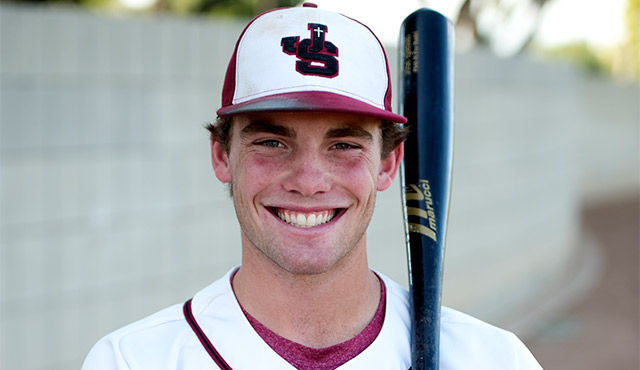Brady Shockey’s in no hurry to experience college life.
The JSerra senior has a baseball scholarship to USC and loads of next-level talent, but he’s mainly focused on the Lions’ next opponent, his next at-bat and the next fastball that speeds his way.
You see, if anyone’s been taught a baseball career can change trajectory quicker than a Clayton Kershaw slider, it’s Shockey.
His father Greg has openly discussed the ups and downs of his own high school, college and minor league playing career, which blossomed at Mater Dei in the late 1980s and brought him so close to the major leagues he could smell the popcorn inside Angel Stadium.
In between those peaks were numerous valleys, often the result of injuries and executive decisions far from his control. That’s why he tells any young player who’ll listen: Focus on the moment and avoid looking too far ahead.
“My dad always says to me, ‘What does W-I-N stand for’? Brady says. “What’s Important Now.”
That motto applies not only to baseball but also Brady’s academics, relationships and other aspects of daily life.
Not only has he developed into one of the top baseball players on one of the best teams in Southern California, but the speedy center fielder carries a strong grade-point average and high SAT score, making USC’s decision to offer him a scholarship before his sophomore season a wise one.
Even then, Shockey refuses to get caught looking ahead.
After all, it was during his father’s senior year at Mater Dei that baseball began taking unexpected turns.
Greg Shockey was one of the best football players in Orange County during his senior season in fall 1987, but injured his throwing shoulder playing free safety, ending his plans of pitching for the Monarchs again that spring.
Shockey hadn’t batted since his freshman year, but was urged to give it another try and ended up hitting .452 for the season. He accepted a late scholarship offer to Cal State Northridge and delivered four strong seasons for the Matadors, but was never drafted by a major league club.
He ultimately signed with the Seattle Mariners and strung together two solid seasons in their minor league system. Shockey figured he was part of their long-term plans, but was unexpectedly traded to the Minnesota Twins for an aging major league pitcher.
Shockey initially believed the Twins were interested in him, but quickly learned they just wanted to dump the pitcher’s salary. He was released the following spring.
His next opportunity came during the major league player strike of 1994-95, when the Angels signed him out of the Independent League during the winter and assigned him to their major league roster as a replacement player.
On a Friday night in front of 22,400 fans at Angel Stadium, Shockey had an RBI single in a 4-1 victory over the Los Angeles Dodgers in their annual Freeway Series the weekend before Opening Day. That would be as close as he’d come to the major leagues.
Two days later, the strike ended and Shockey was sent to the club’s Single-A team at Lake Elsinore. He hit .327, .317 and .339 over the next three seasons, raising his career average to .321, but Shockey never received another opportunity to play above Double-A and finally called it quits at age 27, the year Brady was born.
At that stage of his life, it was time to start looking ahead.

